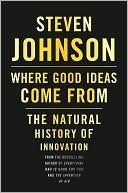The invention of the Audion sounds like a classic story of ingenuity and persistence: a maverick inventor holed up in his bedroom lab notices a striking pattern and tinkers with it for years as a slow hunch, until he hits upon a contraption that changes the world. But telling the story that way misses one crucial fact: that at almost every step of the way, de Forest was flat-out wrong about what he was inventing. The Audion was not so much an invention as it was the steady, persistent accumulation of error.
Error is present in both the evolution of life and the innovation of great ideas, and it is not always a bad thing.
Consider natural reproduction: genes are passed on from parent to offspring, providing “building instructions” for how the offspring should develop. Without occasional mutations, meaning random errors in those instructions, evolution would have long ago come to a virtual standstill. The elephant’s tusks or peacock’s feathers would have never emerged if only perfect copies of existing genes would have propagated. Mutations endow creatures with new traits. While most of them fail fantastically, these errors also produce a few winners, thus driving evolution.


